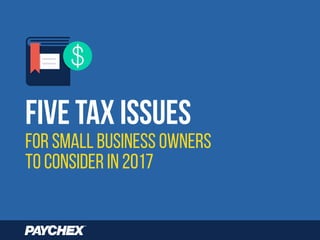
Five Tax Issues for Small Business Owners to Consider in 2017
- 1. for Small Business Owners to consider in 2017 Five Tax Issues
- 2. “Changes to current legislation and uncertainty about the future of tax reform present unique challenges – and opportunities – for small business owners. As we enter the final weeks of 2017 and look ahead to 2018, our goal is to provide small business owners with the latest tax and regulatory considerations, so they can position their businesses for continued success in the year ahead.” Martin Mucci, Paychex President and CEO
- 3. Given the uncertainty of federal tax reform, owners will have to make reasonable assessments of what they anticipate based on the best information available on tax reform and the potential impacts on their business. Accelerating deductions where possible would allow these deductions to be taken at current rates, which, in general, would be higher than subsequent years if tax reform legislation passes. Similarly, deferring business income, where feasible under accounting methods, would allow the income tax at a future rate, which is anticipated to be lower if tax reform legislation is enacted. WHY IT MATTERS 5 TAX ISSUES Tax Reform 1# READ MORE payx.me/taxtips2017
- 4. For tax year 2017, applicable large employers (ALEs), as defined in the Employer Shared Responsibility (ESR) provision of the ACA, must provide a detailed reporting of healthcare coverage. Unlike previous years, there is no transition relief for how an employer files or offers coverage, so to avoid substantial penalties, employers should do their due diligence in reporting timely and accurate information on Forms 1094-C/1095-C. WHY IT MATTERS 5 TAX ISSUES Affordable Care Act (ACA) 2# READ MORE payx.me/taxtips2017
- 5. Tax year 2017 marks the second year of the accelerated due date for W-2 filing. The deadline is January 31, 2018. The Social Security Administration indicated that the number of late W-2s filed in 2017 almost doubled compared to 2016, so employers should ensure all W-2s are submitted on-time to avoid late or non-filing penalties from the IRS. WHY IT MATTERS 5 TAX ISSUES Accelerated W-2 Form Filing 3# READ MORE payx.me/taxtips2017
- 6. Employers who start a 401(k) plan, have no more than 100 employees, and received at least $5,000 in compensation for the tax year are eligible for the Credit for Small Employer Pension Plan Startup Costs. The credit, up to $500 per year for each of the first three tax years, can be used to offset the costs of establishing an eligible plan as well as educating employees about the plan. WHY IT MATTERS 5 TAX ISSUES 401(k) Tax Credit 4# READ MORE payx.me/taxtips2017
- 7. QSEHRAs provide non-ALE small employers that do not provide group health coverage a method to reimburse employees for the cost of individual insurance, and/or qualified medical expenses, on a pre-tax basis. The programs require the benefit be provided to all eligible employees, have a notice requirement, and allow only employer contributions to a statutory maximum amount. WHY IT MATTERS 5 TAX ISSUES Qualified Small Employer Health Reimbursement Accounts (QSEHRA) 5# READ MORE payx.me/taxtips2017
- 8. www.paychex.com/worx/ For more helpful tips to advance the long-term success of your small business, visit The information contained within is not tax or legal advice. These issues are complex and applicability depends on individual circumstances. Businesses should consult tax or legal counsel before taking action on any of the items identified above.
